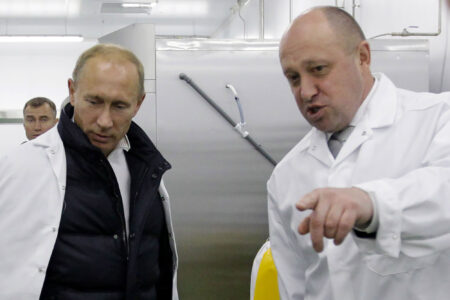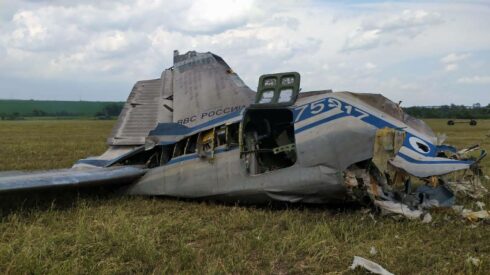On June 26, President of the Russian Federation Vladimir Putin and Yevgeny Prigozhin, the founder of the Wagner PMC, commented on the so-called March of Justice that took place two days ago, which the Kremlin assessed as a mutiny.
According to Prigozhin, the main goal of his actions on June 24 was to prevent the termination of Wagner’s activities after the authorities demanded that all fighters sign contracts with the Ministry of Defense.
“The goal of the campaign is to prevent the destruction of PMC “Wagner” and to bring those who made so many mistakes in the course of the Special Military Operation to justice.”
“We did not have the goal of overthrowing the existing regime and the legitimately elected government, as has been said many times,” Prigozhin added.
Those members of the PMCs who wanted to sign contracts with the Ministry of Defense did it, but they are no more than 1-2% of them. According to him, the leadership of the PMCs made attempts to enter other structures instead of the Ministry of Defense, but none was successful. The decision to organize the March of Justice was made after the Ministry of Defense allegedly struck at the camp of the Wagner PMCs. Prigozhin claims that 30 people died as a result of the attack. The Defense Ministry denied the accusations.
According to him, the Wagner PMCs is “the most experienced and combat–ready unit in Russia, which has achieved good results in Ukraine.”
“As a result of intrigues and ill-considered decisions, the PMC had to cease to exist on July 1. Most of the fighters refused to sign a contract with the Ministry of Defense, realizing that they would be used as cannon fodder. Those who wanted to go to the Ministry of Defense, did, but this is 1-2%. We were going to leave on June 30 and hand over the equipment near the headquarters of the Special Military Operation. We did not show any aggression, but we were hit by a missile strike, about 30 fighters were killed. This was the trigger – we decided to move out immediately. I said that we are not going to show aggression, but if they hit us, we will respond,” he said.
The founder of the PMCs stated that during the March, “not a single soldier [of the Ministry of Defense] on the ground was killed.” At the same time, Prigozhin said that the mercenaries “were forced to strike at the aircraft” of the military, who, “threw bombs and launched missile strikes.”
According to unofficial reports, in total, the Russian Aerospace Forces lost up to 7 aircraft, including six helicopters and an Il-22 military control and relay aircraft with 10 pilots onboard, which did not carry any strikes on the columns of the Wagner PMC, but was mistakenly shot down by Wagner’s ADS. Prigozhin promised to pay 50 million rubles to the families of the victims.
On the other side, two Russian servicemen who supported the PMC were killed, according to Prigozhin. Several others were wounded.
The march of the Wagner PMC lasted 24 hours. One of the columns went to Rostov-on-Don, the other headed towards Moscow, Prigozhin said. The fighters stopped about 200 km to the capital.
“We stopped at the moment when the first assault squad that approached Moscow deployed artillery, did reconnaissance of the area. It was obvious that a lot of blood would be spilled at this moment. We felt that the demonstration of what we were going to do was sufficient,” said the founder of the PMC. “We were going to demonstrate our protest, not to overthrow the government in the country,” he added.
The head of the PMCs said that “the march revealed serious security problems throughout the country.”
“Our march revealed serious security problems throughout the country – we blocked all airfields and military units. In 24 hours we have passed the distance that corresponds to the distance from the place of the start of the Russian troops on February 24, 2022 to Kiev and from the same point to Uzhgorod. If at the beginning the military tasks were performed by the same people as the “Wagner” fighters, perhaps the “special operation” would have lasted a day,” he noted.
At that moment, the President of Belarus Alexander Lukashenko offered his help to find a solution for “further work of the PMC in a legitimate jurisdiction,” Prigozhin claims. Prigozhin did not clarify what agreements the parties reached.
In his turn, Vladimir Putin drew the line under the armed rebellion. He thanked the people for its unity and support and made it clear that from the point of view of the state, this was an armed rebellion and there will be no revision of this position. The Wagner PMC could no longer operate on the Russian territory. The mercenaries are offered to sign the contract with the Ministry of Defense of the Russian Federation or go home to their relatives. They can also follow Prigozhin and move to Belarus.
The Wagner PMC is likely to continue its military operations after it moves to Belarus. It also should not be excluded that the professional fighters of the PMC could come back to the Ukrainian front lines or they will continue to perform military tasks in other countries.



